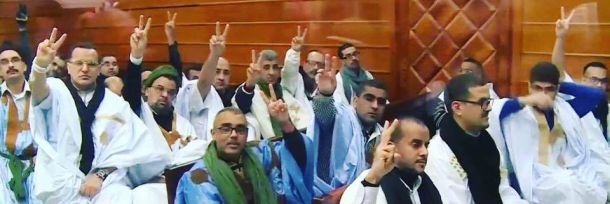
Having been adjourned three times already, the trial is expected to take off today, though 22 of the defendants have spent nearly two years in pre-trial custody. Moroccan law edicts that a defendant cannot be imprisonned for a period exceeding 12 months without trial.
The charges against the Saharawi detainees include belonging to an armed gang, use of violence against representatives of the public forces exercising their duties, causing death by use of violence to Moroccan agents (applied to 12 of the accused) and desecration of a corpse (2 of the accused). In addition, they are charged with undermining state security - which could lead to life-imprisonment.
But most of the defendants are known for their longstanding human rights activism and their advocacy for an independent Western Sahara. Among those facing the court today is the president of the Saharawi Committee for the Protection of Natural Resources (CSPRON).
Just yesterday, the European Parliament adopted a Resolution calling for the release of all Saharawi political prisoners.
Most of the defendants were arrested on the backdrop of what has come to be known as the Gdeim Izik protest camp. In the autumn of 2010, thousands of Saharawi civilians took part in a spontaneous act of protest against the social and economical discrimination they endure in their occupied land. They pitched their tents a couple of miles outside of El Aaiun, the Western Saharan capital, in a place called Gdeim Izik. After a few weeks, and a continuous influx of more and more protesters, the Moroccan military attacked the camp and burned it to the ground on 8 November 2010. In the days following the violent dismantlement, Morocco did not allow media, foreign observers or even the UN peace force for Western Sahara, MINURSO, to come near the camp site.
As protesters were forced back to El Aaiun, after the destruction of the camp, street riots broke out, against symbols of the Moroccan occupation and the continuous plunder of Western Sahara.
Life sentences confirmed for political prisoners
The Moroccan Court of Cassation yesterday confirmed the harsh sentences rendered against the so-called Gdeim Izik prisoners. The group took part in the mass protest on socio-economic marginalisation in Western Sahara in 2010.
Soon 10 years of wrongful imprisonment: release Gdeim Izik group now
Western Sahara Resource Watch calls for immediate and unconditional release of the group of leading Saharawi activists who were arrested in 2010 for advocating for socio-economic rights of the Saharawi people.
South Africa stands up against the plunder of Western Sahara
The Government of South African today issued a strong statement of support for International Humanitarian Law in Western Sahara during a meeting in Geneva today.
Civilian court follows military court against Saharawi activists
Verdict comes after years of accusations that the trials were politically motivated, imprisoning activists who stood up against Morocco's social and economic deprivation of Saharawis.



